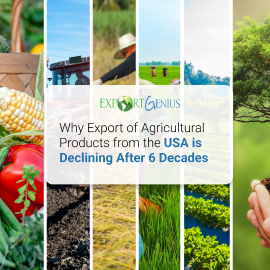Israel Food Tariffs Removal To Lower Prices, Risk Of Food Insecurity
14 December 2022
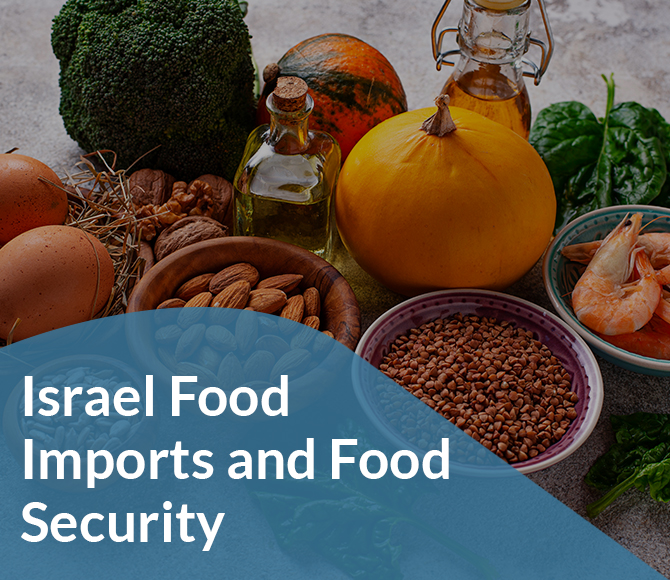
The Israeli government’s decision to open the domestic
market of fruits and vegetables to other countries to invite imports by freeing
tariffs is under review. The said decision is being taken by the government of
Israel in order to curb the local prices. This decision, however, has
implications for a larger threat looming over the long-term food security of
Israel and its citizens. The imports are already the highest and fastest
growing and combined with other factors, it threatens the food security in Israel.
Food and
Related Imports
The imports of food and agricultural products in Israel are shown below in Israel’s import data, featuring yearly values of imports from 2017 to 2021. As can be seen from the image, the imports in 2021 accounted for the highest value of imports, standing at a total of $4.6 billion.
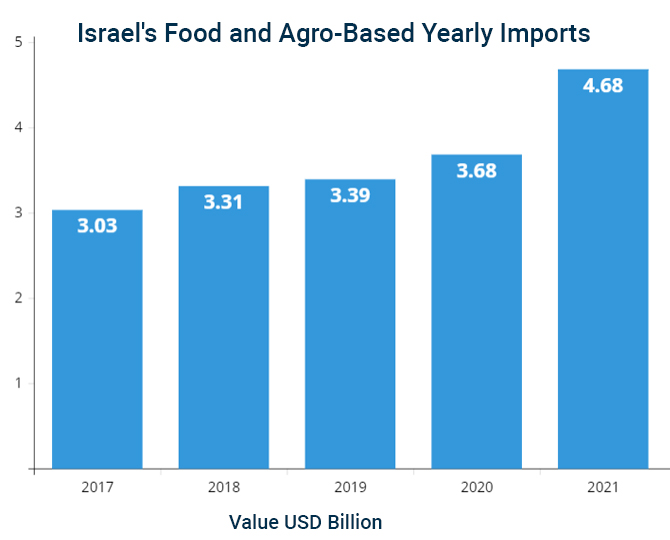
|
Israel's Food and
Agro-Based Yearly Imports |
|
|
Year |
Value USD Billion |
|
2017 |
3.03 |
|
2018 |
3.31 |
|
2019 |
3.39 |
|
2020 |
3.68 |
|
2021 |
4.68 |
The top imports for food-related commodities by Israel
in 2021 were—Miscellaneous Food Preparations ($246.1M), Oil Cake ($164.4M),
Dog/Cat Food ($141.1M), Vegetables ($140.9M), and Substances & Alcoholic
Solutions ($131.5M). Check the full list of commodities below.
|
Israel's Top
Food-Related Imported Commodities (2021) |
|
|
Commodity |
Value USD Million |
|
Miscellaneous Food Preparations |
246.11 |
|
Oil Cake, etc. Made From Soybean
Oil Extract |
164.46 |
|
Dog or Cat Food For Sale |
141.10 |
|
Dried & Mixture of
Vegetables |
140.98 |
|
Substances & Alcoholic
Solution (For Beverage Manufacture) |
131.57 |
|
Chocolate and Preparations
Containing Cocoa |
124.76 |
|
Cane or Beet Sugar, Chemically
Pure Sucrose |
121.63 |
|
Semi-Milled or Wholly-Milled
Rice |
116.27 |
|
Whiskey |
110.62 |
|
Bread, Pastry, Cakes, and
Biscuits |
109.71 |
Fruits and
Vegetables
The farmers in Israel are upset by the decision as
this might hinder with the domestic production and their individual benefits
from the output/yield. The tariff-free imports of fruits and vegetables by the
Israeli government might lower the prices of fruits and vegetables
domestically, but it will bring long-term threats as Israel already imports a
lot in order to curb the prices, as per reports.
Israel’s top importation in fruits (Chapter 08) consists of apples with an import value of $60.5 million, followed by Cashews with a total value of $43.7 million, Pistachios with an import value of $34.7 million, Pecans with $34.2 million and Walnuts for an import value of $32.5 million.
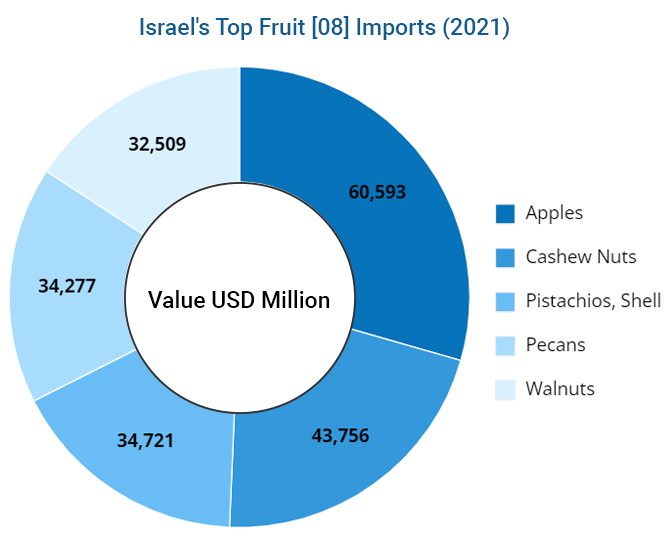
|
Israel's Top Fruit
[08] Imports (2021) |
|
|
Fruits |
Value USD Million |
|
Apples |
60,593 |
|
Cashew Nuts |
43,756 |
|
Pistachios, Shell |
34,721 |
|
Pecans |
34,277 |
|
Walnuts |
32,509 |
Israel’s top importation in vegetables (Chapter 07) consists of sweet corn with an import value of $131.2 million, followed by tomatoes with a total value of $19.2 million, potatoes seed with a value of $16.9 million, chickpeas with a value of $14.5 million, and garlic with $12.6 million.
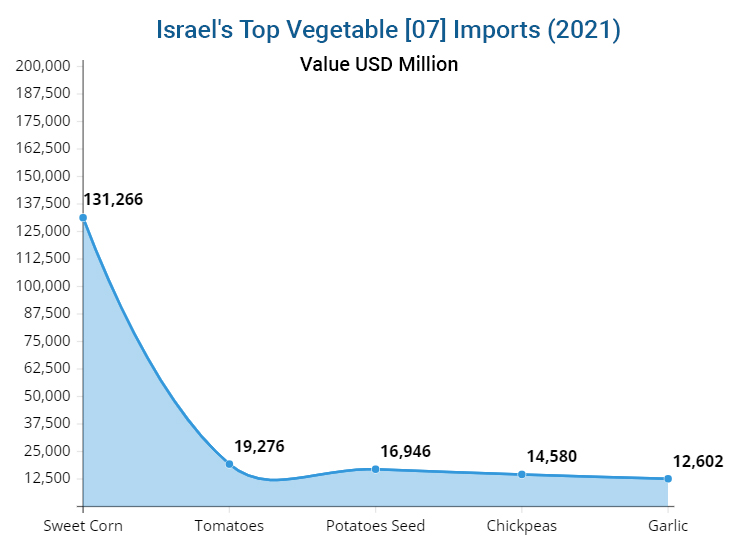
|
Israel's Top
Vegetable [07] Imports (2021) |
|
|
Vegetables |
Value USD Million |
|
Sweet Corn |
131,266 |
|
Tomatoes |
19,276 |
|
Potatoes Seed |
16,946 |
|
Chickpeas |
14,580 |
|
Garlic |
12,602 |
One of the factors that threaten the long-term food security of Israel is climate change factors and reduce in the nutritional value of the imported fruits and vegetables. The top importing partners for Israel in importations of fruits and vegetables for 2021 are listed below.
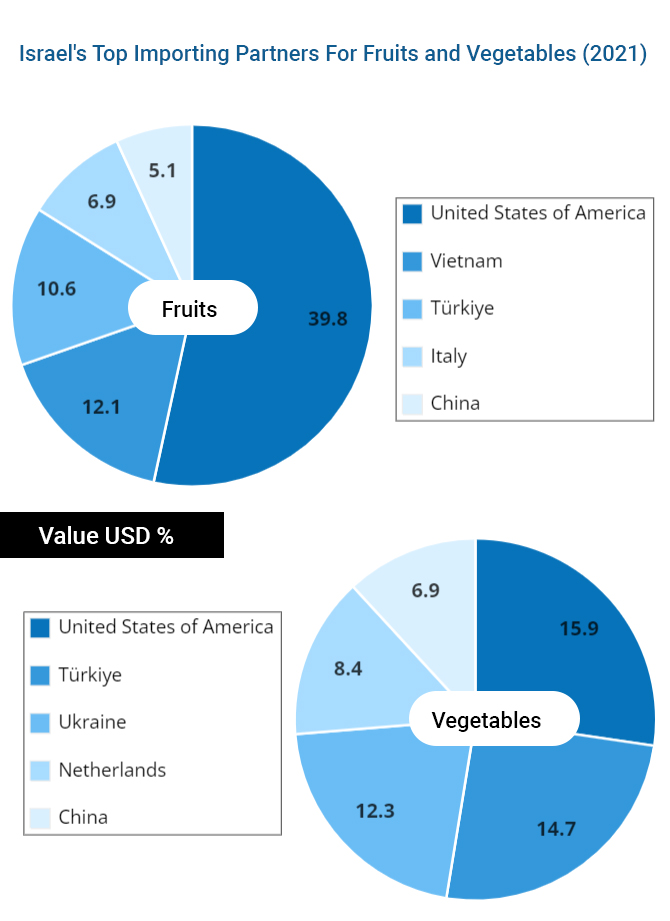
|
Israel's Top
Importing Partners For Fruits and Vegetables (2021) |
|||
|
Country |
Fruits |
Country |
Vegetables |
|
United States |
39.8 |
United States |
15.9 |
|
Vietnam |
12.1 |
Türkiye |
14.7 |
|
Türkiye |
10.6 |
Ukraine |
12.3 |
|
Italy |
6.9 |
Netherlands |
8.4 |
|
China |
5.1 |
China |
6.9 |
|
|
Value USD % |
|
|
The other factors which will contribute to the
deterioration of the market, putting food security of Israel in a long-term at
risk, are supply chain disruptions resulting from the COVID-19 pandemic and the
Russia-Ukraine crisis going on that started in February 2022.
Fruits and vegetable reports of Israel indicate that
the prices of fruits and vegetables in Israel are already affordable, hence,
the further decline in the price of fruits and vegetables by removing import
barriers (such as import tariffs) will raise concerns over long-term food
security.






